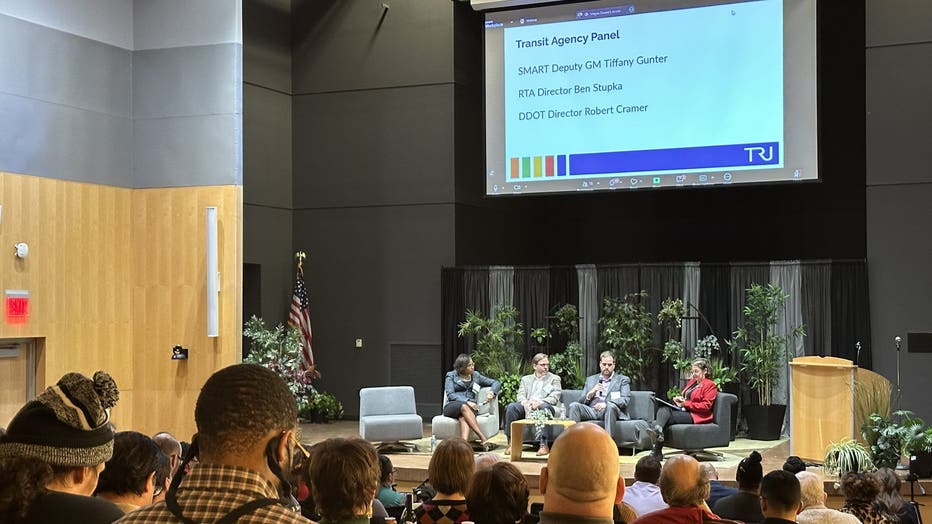Michigan's public transit community celebrates 2024 successes, but funding issues remain

State Sen. Mallory McMorrow (left), Rep. Ryan Morgan, Wayne County Executive Warren Evans, and Megan Owens, director of TRU
DETROIT (FOX 2) - Between policymakers from Lansing to the officials who run the transit services that advocates hope to expand in the future, many of the figures involved in pushing for better ridership experiences convened in Detroit on Tuesday.
They celebrated some of the victories over the past year, including at the legislative level when lawmakers ended Wayne County's opt-out option within its transit network.
But many challenges remain and uncertainty across varying levels of government means any further improvements could be hard to come by in the near future.
Big picture view:
Speaking before a crowd inside Wayne State University's Industry Innovation Center, Megan Owens admitted efforts to expand transit would be a challenge, but also expressed confidence in the momentum behind the push.
"This room is packed," the executive director of Transportation Riders United said.
The evening highlighted improvements in service for bus service for seniors in Oakland County, the change in dialogue people have around transit, as well as the near-passage of hundreds of millions in transit funding over the next decade.
But it was Wayne County's legislative victory during a crammed lame duck period in Lansing last year that garnered the biggest applause.
"It was a miracle we were able to get it there, to get it through," Wayne County Executive Warren Evans said.
But uncertainty around funding after the White House paused federal grants and a divided government in Lansing for the next two years means any further improvements could be hard to come by.
"We are in a divided government, so now Democrats and Republicans have to work together to get anything done," said State Sen. Mallory McMorrow. "In an ideal world, we would have worked together already. But that is not the political era that we live in."
Local perspective:
While the big picture challenge included more funding, service reliability and having enough staff represented some of the local problems that officials had to overcome in 2024.
Patty Fedewa is a frequent rider of metro Detroit's buses and thanked the Detroit Department of Transportation for improving service on Jefferson Avenue, but added Woodward needed better options on the weekend.
Tiffany Gunter, the COO of SMART, said last year started with "a lot of problems and not a lot of answers."
She said SMART was down 180 employees at the start of 2024, with shortages in mechanics, drivers, and fixed-route operators. It led to tension with the TRU community, who were upset by the unreliable service that followed.
SMART has since added more employees while buses have gotten fixed quicker.
"With people you can do so much more," she said. "Today, while I have some problems remaining, I don't have as many."

SMART COO Tiffany Gunter (Left), RTA Director Ben Stupka, DDOT Director Robert Cramer, and Megan Owens.
What they're saying:
Democratic Representative Jason Morgan of Ann Arbor said advocates would need to go into "protection mode" for funding that's already been secured for the Local Bus Operating program now that Democrats no longer control the legislature.
"We are going into very different times this next couple years in terms of leadership in Michigan and Washington D.C.," he told the crowd.
Despite concerns that a Republican majority in the Michigan House would blunt any efforts at expanding transit, he encouraged advocates to not count out any lawmakers regardless of party - adding that he has been in touch with at least one conservative in Lansing interested in working on transit.
But to effect real change, he implored voters to apply "persistent, respectful pressure" on lawmakers once legislation comes up.
McMorrow believes they would have a more convincing argument if advocates can broaden the benefits behind expanding transit.
"We put a stake in the ground to say that transit is economic development in a big way," she said. "And just because we didn't get our efforts across the finish line doesn't mean that's not progress."
The Strategic Outreach and Attraction Reserve, or SOAR, is a program for large-scale economic development in Michigan. McMorrow spearheaded a plan to use SOAR to commit $10 billion to projects like transit over the next 10 years.
It never made it to the governor's desk, but represented one of the closest efforts toward adding the necessary money to transform transit in Southeast Michigan and beyond.
Dig deeper:
Michigan draws down millions in federal funding every year for its budget, while nonprofits rely on federal grants to provide services of their own. Transit agencies have also benefited from the money.
To underscore the fragility of funding, Regional Transit Authority director Ben Stupka pointed to the Detroit to Airport Express program.
The DAX system started before the NFL Draft and offered direct transportation between Detroit Metro Airport and downtown Detroit. It was funded with the help of a $2 million grant through the federal government's infrastructure act.
But on Tuesday, the White House paused all federal funding, sparking confusion and disruptions to services like Medicaid before a judge blocked the freeze.
The RTA and the lawmakers on stage were also unsure what the scope of the freeze could mean - but argued it was a sign that procuring any other funds could be harder to come by over the next four years.
"We are in a period of complete chaos with our federal situation so we're trying to understand what's going to yield from that," said Stupka.


